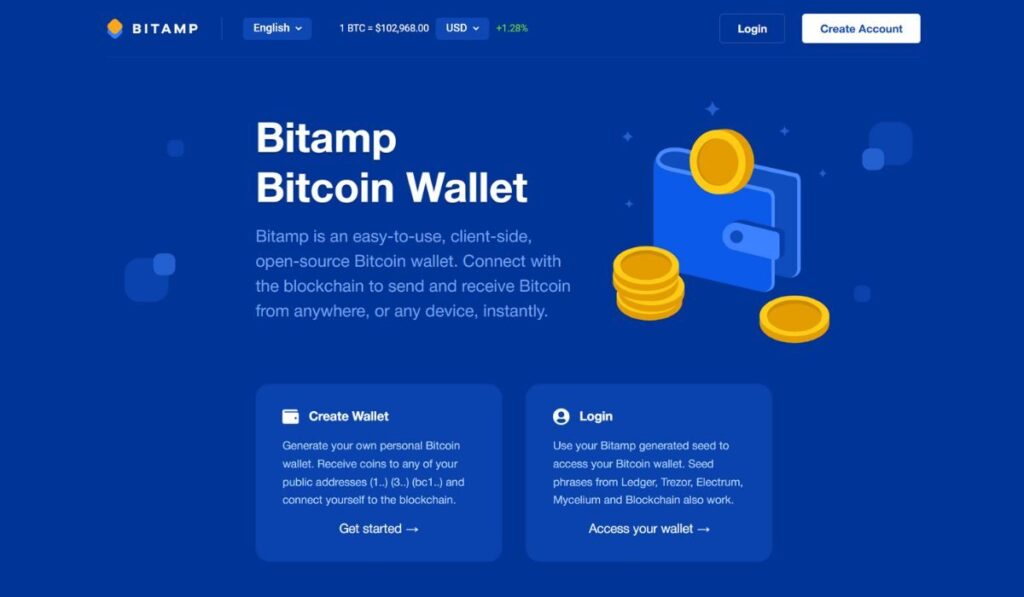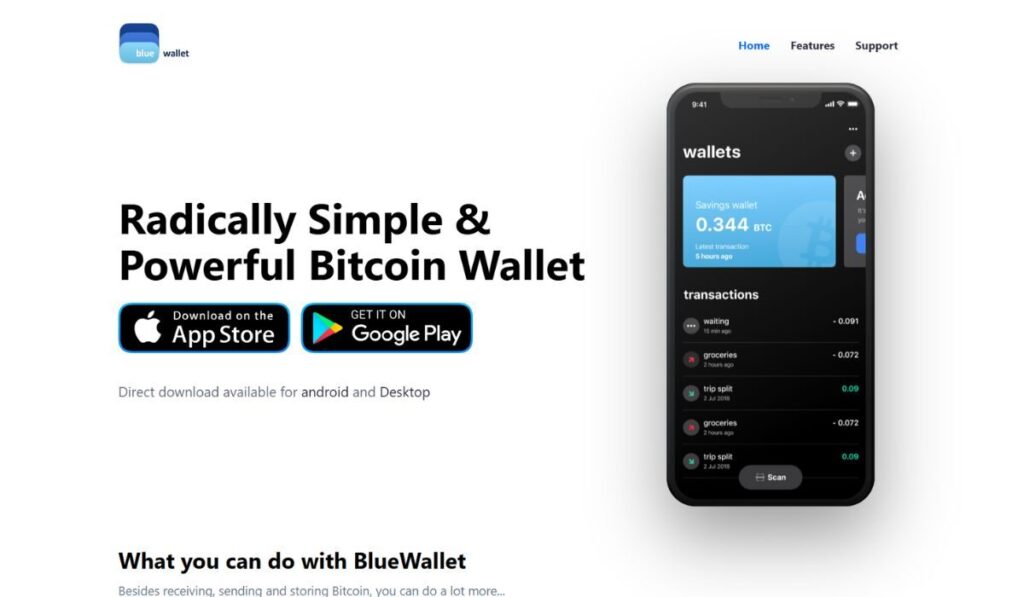Top 10 Bitcoin Wallets To Store Your BTC

Bitcoin storage is a major concern for token holders, and this is where wallets come into play. Bitcoin wallets store the private keys of your wallet safely, without exposing them to threats. There are several types of wallets customized to meet your needs.
In this article, you will read about the top 10 wallets that you can use to store your BTC.
What Is A Bitcoin Wallet?
A Bitcoin wallet is a storage tool for safe storage of the private keys. You can receive, send, and store Bitcoin as well as other cryptocurrencies on these wallets.
There are two important components for a crypto wallet: public keys and private keys. A public key is similar to your bank account number; you can share it with anyone. But private keys are like your password or PIN, which you should not share with anyone. Wallets do not store Bitcoin, but store their private keys.
What Are The Types of Bitcoin Wallets?
Based on the way in which keys are stored, Bitcoin wallets are broadly divided into hot and cold wallets.
- Hot Wallets: Hot wallets are ideal for daily transactions. They are connected to the internet and are user-friendly.
- Cold Wallets: Cold Wallets are more secure than hot wallets, as they are not linked to the internet. They are commonly used for storage.
Based on who controls the private keys, wallets are divided into custodial and non-custodial wallets.
- Custodial Wallets: The custody of your private keys is taken care of by a third-party organization, such as a cryptocurrency exchange. It is more beginner-friendly and convenient to use.
- Non-custodial Wallet: You are the sole custodian of the wallet’s private keys. It is difficult for ordinary users to handle a non-custodial wallet because they need to have the technical expertise to use it.
Top 10 Bitcoin Wallets in the Market
Here are the top 10 Bitcoin wallets available in the market now.
| Wallet Name | Key Features |
|---|---|
| Bitamp | 100% client-side wallet, no registration required, doesn’t store private keys or seed phrases, |
Electrum Wallet | Compatible with Ledger & Trezor, two-factor verification, multi-signature, high security |
Unisat Wallet | Supports Runes, Ordinals, and BRC-20; connects to dApps like Bool Bridge & Detrading |
| BlueWallet | Open-source, peer-reviewed, biometric security, supports Lightning transactions, multi-signature |
| Trust Wallet | Supports 100+ blockchains, built-in dApp browser, NFT storage, AES-encrypted private keys |
OKX Wallet | Supports 130+ blockchains & 300K+ tokens, integrated trading, futures & options, self-custodial |
| Phantom Wallet | Supports Solana, Bitcoin, Ethereum, Polygon; AI fraud detection; biometric security; staking & trading |
| Ledger | Cold storage, two-factor authentication, market analysis & tax tools, dApp connectivity |
| Trezor | Supports 1000+ cryptocurrencies, seed phrase recovery, responsive support, and multi-account setup |
Coinbase Wallet | Self-custody, dApp integration, mobile & web access, stablecoin interest earnings |
1. Bitamp

Bitamp is a 100% client-side wallet based on web browsers. The wallet does not require you to register for it. Since it is operating from the browser, it does not store any data such as private keys and seed phrases. It is open source and free of cost.
2. Electrum Wallet
Electrum is the best secure wallet for advanced users. This wallet can be paired with hardware wallets such as Ledger and Trezor. The wallet supports security standards such as two-factor verification and multi-signature. It is compatible with multiple operating systems such as Windows, macOS, Linux, and Android.
3. Unisat Wallet
This wallet supports transactions using Bitcoin Ordinals, Runes, and BRC-20 assets. You can also connect the wallet with several dApps, such as Bool bridge (decentralized cross-chain bridge), Detrading (atomic swap platform), and BTC Module (native BRC-20 swap). Unisat is available on multiple platforms such as Windows, Mac, Linux, Android, and as a browser extension.
4. BlueWallet

BlueWallet is the best wallet for mobile users. It is open-sourced and peer-reviewed. The wallet is secured by biometric verification. The wallet is also multi-signature compliant. BlueWallet’s custodial Lightning wallet supports instant transactions. On the overview screen, you can view your balances in multiple currencies.
5. Trust Wallet
Trust Wallet is best suited for multichain portfolio management. Apart from Bitcoin, the wallet supports 100+ blockchains. The wallet’s built-in browser helps you connect with dApps across these chains. You can also store and manage NFTs in this wallet. The private keys on this wallet are AES-encrypted and stored in your device.
6. OKX Wallet
OKX is the self-custodial wallet for OKX exchange users. It supports 130+ blockchain networks and over 300,000 tokens. Since this wallet is integrated with the OKX exchange, you can trade Bitcoin with ease. You can also use this wallet for futures and options trading and perpetual swaps. The app is available as a mobile and web version.
7. Phantom Wallet

Phantom Wallet is tightly integrated with the Solana blockchain. It also supports Bitcoin, Ethereum, and Polygon, too. The wallet uses AI to detect and block fraudulent transactions. Auto-lock security and biometric verification are used for your safety. With this wallet, you can buy, stake, and trade cryptocurrencies within the wallet. For additional security, you can connect the Phantom wallet with other hardware wallets, such as Ledger.
8. Ledger
Ledger is the best hardware wallet to store the private keys of your Bitcoin holdings. As it is a hardware wallet without any internet access, your assets are safe from malware or phishing attacks. Even then, you can connect your wallets to dApps and exchanges. To ensure user safety, Ledger uses two-factor authentication and multi-signature support. Ledger also has built-in tools for market analysis and crypto tax calculation.
9. Trezor
Trezor is a fully open-source hardware wallet for Bitcoin storage. It supports over 1000 cryptocurrencies. The wallet uses standard seed phrases for recovery of the stored private keys. The team is quick and responsive in case of security issues. You can also create multiple accounts on this wallet.
10. Coinbase
Coinbase is a self-custody wallet with multichain support. The wallet connects users with the dApps of multiple chains. The wallet has a mobile app and a web browser version for easy accessibility. With this wallet, you can earn passive income with the interest on stablecoin deposits.
How To Choose The Best Bitcoin Wallet?
The best Bitcoin wallets give priority to the user’s security, convenience, and the overall speed of the transactions. The features of the best Bitcoin wallets are given below.
- Choose a secure Bitcoin wallet. Wallet’s security is important as there are chances of hacking with compromised security. Secure wallets have features such as two-factor authentication (2FA), PIN protection, and reliable backup/recovery options (seed phrase)
- Choose hot or cold wallets according to your usage and needs. If you want to do daily transactions, you can use a hot wallet. Cold wallets can be used for long-term storage of Bitcoin.
- Hot wallets can be hacked as they are linked to the internet; cold wallets are much safer.
- If you are a beginner, opt for a wallet with an intuitive interface and easy-to-use features. Advanced users can go for wallets that give them more control over transaction fees and coin selection.
The Bottom Line
Now that you know how to choose the best Bitcoin wallets for storing your private keys and have 10 options to choose from, you can create an account in one of these wallets and store your private keys safely. Before starting, read more about the wallet on its official website and understand what services it offers.
Crypto & Blockchain Expert
